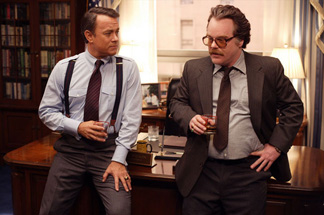|
|
Review: Charlie Wilson's WarBy Matthew HuntleyJanuary 31, 2008
With the help of CIA agent Gust Avrakotos (Philip Seymour Hoffman), Charlie formulates a plan of purchasing Soviet weapons from the Egyptians and giving them to the Afghans so they can defend themselves (because it can never look like the United States helped the Afghans, he has to make it look like the Afghans stole the Soviets' weapons). At first, Charlie's personal war is given a budget of half a million dollars, but that burgeons all the way to a billion and the Afghans, slowly but surely, begin to retaliate against the Soviets and their destructive helicopters. What makes "Charlie Wilson's War" so engaging is the idea that such a mission really happened. The film is based on George Crile's Charlie Wilson's War: The Extraordinary Story of the Largest Covert Operation in History and it's sometimes unbelievable that Wilson's plan actually worked. Much of it seems like a fictional satire, or perhaps a fable, on war itself, where the end lesson is, once again, that violence begets more violence, and that war, in one way or another, is but a vicious cycle. But it's fascinating to think these events are based on fact. The cast doesn't seem to be in it for the glory. These are intelligent roles for Hanks, Roberts and Hoffman. Aaron Sorkin's screenplay, which isn't as showy as his other works, seems less "scripted" than usual. Sorkin's dialogue, which can sound so rehearsed and melodramatic, is brought down to earth by the actors, who give it a random, convincing air. Nichols lets us get to know the characters, too, so that we care more about their quest from a personal standpoint and not just for the sake of the plot. In the end, we believe Charlie deserves his award, but are also torn about it after a speech Avrakotos gives to Wilson on the balcony. It all suggests the United States only likes to get involved with other countries' affairs when there's action to be taken. We're not so much enthused in the long processes of education and teaching other countries to stabilize themselves through non-violent means. Sure, we'll give money if it means blowing sh*t up, but building a school for a fraction of the cost? Are you kidding? This is an entertaining Hollywood film that has a lot to say underneath its glamorous facade. Hanks, Hoffman and Roberts play real-life people who want to make a difference, do, but then are turned away when they want to get at the root of the difference they were trying to make in the first place. Charlie Wilson's "war" may literally mean the war that was financed and fought between the Afghans and Soviets, but it also symbolizes the lasting war, which is being fought by all of us, against the system that turns its head when real efforts need to be made so that people like Charlie Wilson don't need to take on an entire mission by themselves.
|

|
|
|

|
Thursday, October 31, 2024
© 2024 Box Office Prophets, a division of One Of Us, Inc.


